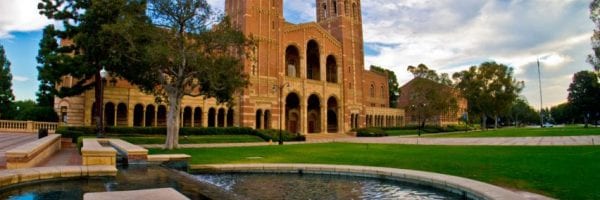Work Friends May Not Get Better Benefits, According to UCLA – LA News

As we fully unroll into the new year, we take a look at some of the biggest recent news coming out of Los Angeles.
UCLA Anderson Professor on Work Friendships’ Effects – UCLA Anderson News
Research by Eugene Caruso, Associate Professor of Management and Organizations at UCLA Anderson School of Management, recently received note in the online forum Quartz at Work.
Caruso, along with colleagues from the University of Chicago and Hebrew University, studied the consequences of friendships between managers and employees. Through a series of experiments, the team discovered that when a boss makes a decision, such as who gets a bonus, they are actually less likely to give it to a friend in order to appear impartial. This tendency remained much of the time even when the friend was the more highly deserving candidate for the bonus.
Notably, when managers had to make a decision on a bonus that would remain private, they were more likely to choose the deserving friend. Participants in the research were told that the friend had performed only slightly better than the other bonus candidate, and that the choices were to give the friend the merit-based bonus or to flip a coin to decide between the two. In the public decision scenario, the deserving friend received the bonus 27 percent of the time. When the deserving worker was the non-friend, participants granted the bonus over 60 percent of the time.
The research overall revealed that participants were more likely to approve of the merit-based bonuses. The study can serve as an important model for HR managers on the unintended outcomes of workplace relationships.
Read more about the team’s research here.
Mihaylo Professors on China Trade War and the SoCal Economy – Mihaylo News
Associate Professor of Economics Pedro Amaral and Lecturer Aaron Popp of Cal State Fullerton’s Mihaylo College of Business have examined the impact of the U.S. and China Trade War upon one of the most influential economies, that of Southern California. The region serves as a hub of trade with East Asia.

Cal State Fullerton professor Pedro Amaral
In the panel discussion last month sponsored by the CSUF Economic Association, Amaral and Popp presented their research.
“About 46 percent of total Chinese imports are being tariffed, but L.A. is serving a smaller percentage of those products [that are being tariffed]–41 percent. But any later round of tariffs will have a harder impact on the local economy,” Popp notes.
Reflecting upon the long history of the tension between the two world powers and the nature of China’s transition, Amaral says, “China has had an incomplete transition into capitalism, which the West still ponders about China …We used to think that once they got into free trade, they would become a freer society upon the embrace of the market economy. But they haven’t, which is something my liberal mind struggles with.”
You can read more on Popp and Amaral’s discussion here.
Graziadio Strategy Professor on Corporate Boards and Entrepreneurship – Graziadio News
Dr. Mark Tribbit, Pepperdine Graziadio Assistant Professor of Strategy, was honored recently for his scholarly research with the 2018 Emerald Literati Award. For the past 25 years, the award has acknowledged valuable contributions to scholarly research.
Tribbit’s research, “An Agency Perspective on the Board of Directors and Corporate Entrepreneurship,” examined the effect of takeovers upon internal entrepreneurship. The outcome of the research will help corporate boards to foster entrepreneurial efforts by staff.

Dr. Mark Tribbit, Pepperdine Graziadio Assistant Professor of Strategy / Photo via newsroom.pepperdine.edu
In addition to his professorship, Tribbit serves as the Academic Director of Graziadio’s full-time MBA program. Experienced in management for corporate, retail banking, and wholesale, Dr. Tribbit received his MBA from Villanova University, and his Ph.D. in strategic management from Drexel University.
You can read more about Dr. Tribbit’s award and his full article here.
San Francisco’s Top 3 Economics MBA Programs

When it comes to learning about economics, what better place than Silicon Valley?
San Francisco holds a number of schools that offer an MBA with a focus on economics. The Bay Area is not just a place of lax tech bros though. It’s a place booming with culture and treasures like the Golden Gate Bridge and the Pacific Coast Highway. The beach isn’t too far, either.
But if you are looking for a place to build a resume, San Francisco is it: It ranks among the nation’s best performing cities. San Francisco is also second among cities in the U.S. for GDP growth associated with tech firms.
While many schools in the area hold prestigious MBA programs, here are the top three for where to obtain an economics MBA.
Haas School of Business – UC Berkeley
The Hass School of Business at UC Berkeley has been around for nearly 30 years, since 1989. The Berkeley name itself holds a sense of prestige, but the Haas School even more so. It’s the oldest business school at a public institution. That’s something.
As for its MBA programs, the Haas School offers a full-time, Executive, and a part-time MBA, for which students can take classes in the evening or on weekends. The full-time MBA takes two years and includes a variety of focus areas students can do via electives. One area of focus is economic analysis and policy.
This focus gives candidates that economic edge needed to make it in the field. This focus starts from a student’s first year though the electives tend to become more dominant in the second year. The courses make up 60 percent of the curriculum. Some of these electives use a macroeconomic lens to look at the global economy. Others look at the housing and urban economy from the viewpoint of investors and real estate developers.
Recruiters have come to Haas from healthcare, internet, and solar companies. The program takes just 275 students a year. Those interested in the Haas School of Business must apply by Sept. 21.
Stanford University Graduate School of Business
The Stanford University Graduate School of Business came about after former U.S. President Herbert Hoover, a Stanford alum, helped created the business school in 1925. About 800 students are enrolled in the program at a given time. Sometimes, the program could hold half that size. The Class of 2018 enrollment featured more than 417 students.
The noted university offers a single, full-time MBA program. The business school ensures its curriculum is flexible to fit every student’s needs. By the end of their first quarter, students develop a personalized plan for their foundational courses. That way, they get the basics down before moving onto establish their focus with their experience and goals in mind.
For those interested in economics, Stanford offers two types of expertise: political economics and managerial economics. Here, students can learn about financial crises, contemporary economic policy, managing global political risk, and many more topics.
F.W. Olin Graduate School of Business – Babson College San Francisco
The F.W. Olin Graduate School of Business at Babson College’s San Francisco campus opened not too long ago, in 2011. It offers a unique blended learning program. Not all students can manage the time to come into a classroom. This program is flexible and blends online classes with in-person classes every seven weeks on Fridays and Saturdays.
Core classes get into the nitty gritty all business students need: financial reporting, managing talent, strategy, and others. But students also get the opportunity to take a series of Signature Learning Experiences that take students outside the classroom and into a hands-on learning environment.
Course topics vary from a myriad of things—and economics is among them. The core courses include one on managerial economics and another on how to apply data to economics. The school also gives economics classes about game theory, trade, globalization, and health economics.
Urbanization And Populism Clash, Says Ted Rogers Faculty

There’s a wide gap between rural dwellers and city folks, explains Dr. Kim Bates, Director of MBA Programs at the Ted Rogers School of Management, and Dr. Steven Murphy, Dean of the School. This gap is apparent in the results of the U.S. elections, where “Trump supporters are those who have been left behind by globalization and digitization,” and are stranded in small communities where they cannot get gainful employment, states The Globe and Mail article. According to this populist politics narrative, universities pollute the minds of the young, filling them with new ideas that leave the past behind, and business schools play a major role in this. Continue reading…
Why Should Americans Love Canadian MBA Programs?

It’s not because of the election outcome that American students should head to Canada for their MBA. For many, it should be because of diversity not only in the student body but also in the school’s programming, which often requires students to complete work in other countries. At least that’s one reason Alyssa King decided to leave Texas and go to the University of British Columbia for her MBA. “There’s quite a diverse group of professors here, and the class that they recruit is much more diverse than the classes I saw in the U.S.,” she told the Globe and Mail. Continue reading…
